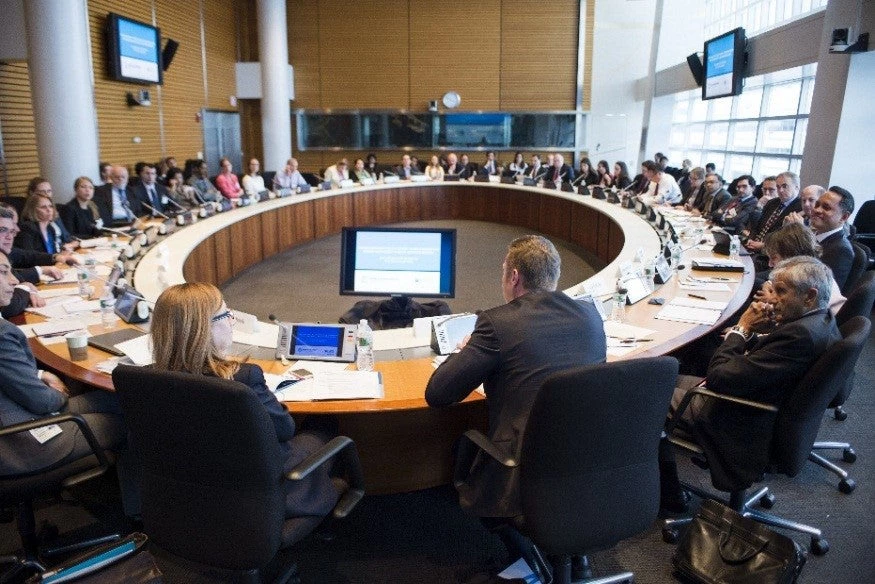
In the spirit of working together to help developing countries reap the benefits of investment, the World Bank Group’s Trade & Competitiveness (T&C) Global Practice and the Organization for Economic Co-operation and Development (OECD) joined forces to make investment climate reforms happen on the ground. In a high-level roundtable event, which took place in the context of the recent WBG Spring Meetings, the two organizations announced their partnership by acknowledging the clear synergies that exist between their respective work programs - namely the OECD’s updated Policy Framework for Investment (PFI), and the diagnostic tools, technical assistance, implementation support and financing instruments provided by the WBG’s Investment Policy and Promotion (IPP) team
The Growing Importance of Investment for Developing Countries
For the past three decades, the private sector has served as the main driver of sustainable economic growth, employment and poverty reduction around the world ( World Bank Group 2015). In particular, private sector investments have been powering international trade and the world economy as a whole. According to UNCTAD’s World Investment Report 2014:
- Between 1990 and 2013, foreign direct investment (FDI) flows increased at an exponential rate - growing eight-fold from $208 to $1,452 billion.
- Today, more goods and services reach consumers through the sales of foreign affiliates than through exports. While in 2013 the dollar value of global merchandise exports was $18.8 trillion and commercial services $4.7 trillion, sales of foreign affiliates reached $34.5 trillion.
- Meanwhile, international production is continuing to expand; between 2012 and 2013, it rose by 9 percent in sales, 8 percent in assets, 6 percent in value added and 5 percent in employment.
These figures shed light on the vital role that foreign direct investment can play in linking a country’s domestic economy to global value chains. Not only does FDI bring investment and jobs to a country, but also increased exports, supply chain spillovers, new technologies and enhanced business practices. In sum, investment is a key vehicle for developing countries to leverage the world economy for domestic growth.
Building the Foundation for Future Collaboration
Realizing all the potential benefits of FDI requires the clear and effective implementation of investment strategies and policies that respond to the realities and aspirations of a country. To attract, retain and maximize the benefits of different types of FDI, developing countries need to establish a favorable investment climate, and for that they need our assistance. International organizations must strive to cooperate with one another and provide more effective, coherent and relevant support in leveraging investments to help countries better connect to the world economy, which is so critical for development, especially given the complex changes in global trade and investment patterns.
Over the course of the last year, the investment policy teams of the WBG and OECD have been exploring ways to work together in the area of investment climate reform. Efforts have not been geared towards negotiating formal instruments or memorandums of understanding, but rather on answering the practical question: How, within our respective mandates, can we collaborate and foster synergies in order to maximize the impact of our respective assistance programs?
The joint event entitled “From Investment Policy Design to Implementation: Making Investment Climate Reforms Happen” laid the groundwork for future collaboration based on:
- Sharing information and collaborating on analytical data gathering initiatives and country-specific investment policy reviews.
- Forging greater cooperation, leveraging the strengths of each, to complement current and future technical assistance (TA) programs in the area of investment policy reform.
- Establishing thought leadership on cutting-edge issues such as new investment actors and how regional investment agreements will affect investment decisions.
- Engaging in advocacy initiatives aimed at bringing together key investment stakeholders, including the private sector to get their inputs into policy making.
Focused on linking investment policy design with implementation, the dynamic roundtable discussion was well received by participants, which included over 80 development practitioners, academics, private sector representatives and high-ranking government officials from Antigua and Barbuda, Cabo Verde, Colombia, Costa Rica, The Democratic Republic of Congo, El Salvador, Finland, Japan, Mexico, Madagascar, Myanmar, Nicaragua, Thailand, the United States and more.
Overall, participants commended the WBG and OECD for rationalizing our respective activities in the area of investment policy reform. Yet, many encouraged us to find more ways to work together on a regional basis, stressing the importance of international investment agreements (IIAs) and their high developmental impact potential. In this direction, it is worth noting external collaboration efforts in this area have already started. The T&C IPP team recently held working sessions with the Australian Department of Foreign Affairs and Trade (DFAT), the European Commission (DG Trade and DG DEVCO), Canada’s Department of Foreign Affairs, Trade and Development (DFATD) and the United Kingdom’s Department for International Development (DFID). These discussions evidenced the significant interest of the international community to continue exploring the relationship between trade and investment, IIAs and domestic reform, and the impact of the latter on private sector development.



Join the Conversation